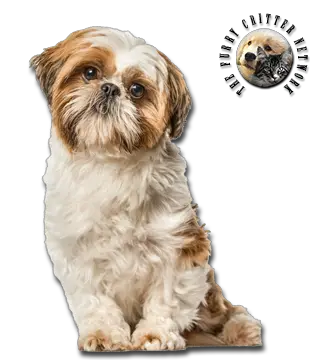Breed Standard
Head: Broad and round. Pronounced stop. Nosebridge 2.5 cm long. Broad, angular, short muzzle. Tousled topknot with hair falling over the eyes. Well-furnished mustache and beard. Hair growing upward on the muzzle resembles a chrysanthemum flower.
Ears: Large, with long pinnae. Carried hanging down. So well-furnished with hair that they blend with the hair of the neck.
Eyes: Large, round, dark or light, depending on coat color.
Body: Fairly long, stout. Chest broad, well let-down. Loin well set-on, solid. Straight back. Strong hindquarters.
Tail: Set on high, carried gaily well over the back, forming an abundant plume.
Hair: Long and dense but not curly. Slightly wavy hair is allowed. Fairly thick undercoat.
Coat: All colors are allowed, but a white flare on the forehead and white markings on the tip of the tail are highly prized in the multi-color variety.
Size: No more than 26 cm.
Weight: 4.5 to 8 kg.
History
The Shih Tzu is most certainly the product of crossing the Lhasa Apso from Tibet with the Pekingese from China. In 1643, the Dalai Lama presented the Manchurian dynasty with a gift of small "lion dogs" (shih tzu). The breed was long appreciated by the royal court, and China's last empress kept them in her palace until 1908. In 1923, a kennel club was founded in Beijing. In 1930, Lady Browning brought the first specimens to England. The British Kennel Club recognized the breed in 1946. In France that same year, the Countess of Anjou founded a kennel and registered the first litters with the Central Canine Society in 1953. The FCI recognized the breed in 1954. The Shih Tzu is less common than the Pekingese and the Lhasa Apso.
Behavior
Lively, very active, and independent, this calm, gentle, merry dog needs lots of love and attention. He is the most outgoing of the Asian breeds. He is indifferent toward strangers and barks to announce their presence. He needs firm and gentle training.
Although small in size, they are well-known for their largely fun and playful personality, and calm and friendly temperament. They are able to adapt well in different situations. Due to their highly independent nature, they are not considered the most obedient breed.
He was meant for the city but needs exercise, including daily walks. He does not like being left alone. He requires daily brushing and combing. It is strongly recommended that the hair on his head be tied back out of his eyes. He needs a monthly bath and regular checking of the eyes. He cannot bear intense heat.
Function
Pet.
Health
Heart Disease
Shih tzu's are prone to multiple types of heart disease. The condition may have a poor prognosis depending on when it is diagnosed and the stage of the disease when it is discovered.
Brachycephaly
Due to the ideal of beauty regarding the shape of the face the skull malformation brachycephaly was increased by breeding selection. This short nose causes problems like skin sensitivities such as dermatitis, bumps, and rashes.
Eye issues
It is very common for Shih Tzu's to develop eye problems at any age, and even more so once they are older. Most veterinarians will recommend eye drops to assist with any eye irritations. Some dogs have allergies which causes excess discharge around the eye. Older Shih Tzu are known to develop cataracts which can be corrected with surgery. If not treated, the dog may become blind in the eye that has the cataract. The distinctive large eyes can easily be scratched which may cause an ulcer. The dog will normally have the injured eye closed or half closed and may have excessive tears. The most common problem of Shih Tzus concerning eye conditions is the formation of epiphora caused by the fur on the eyelids scratching the conjunctiva and the cornea. However this can be mediated by the application of prescribed eye drops from a veterinarian.
Hair issues
Untrimmed hair can be an issue. This is remedied with a top knot or a short puppy cut. Shih Tzus have hair which can grow lengthy. Long hair is required as a show coat and is required generally to be brushed or groomed once a day. Hair longer than a puppy cut often causes issues, including hair covering the eyes of the dog, preventing good visual acuity.
Ear issues
A very common issue for Shih Tzu's is the development of ear infections, as they have a long coat and hair grows in their ears. If ears are not plucked and cleaned often, ear infections will reoccur and need to be treated with ear cleaner and possibly medication, prescribed by the veterinarian. Ear infections may be spotted by an odor coming from the ears, as well as frequent shaking of the head and scratching of the ears.
Skin sensitivities
The Shih Tzu's skin is particularly sensitive and prone to allergies. Ideally, they should be bathed every two to six months to maintain hygiene and prevent skin irritations. They are also prone to stomach issues, and most have delicate appetites.






